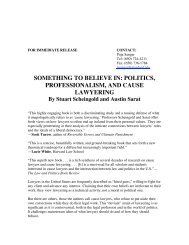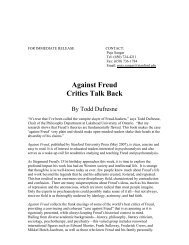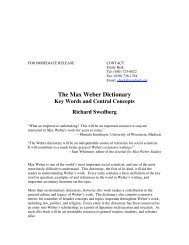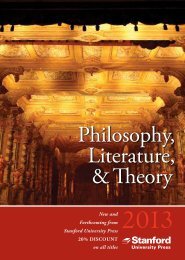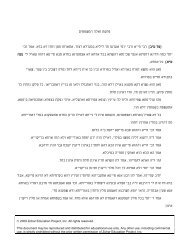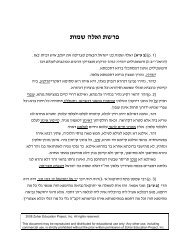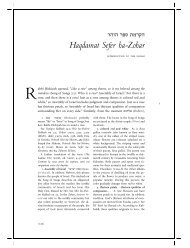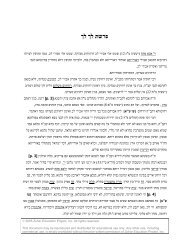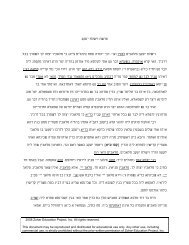Front Matter (PDF) - Stanford University Press
Front Matter (PDF) - Stanford University Press
Front Matter (PDF) - Stanford University Press
Create successful ePaper yourself
Turn your PDF publications into a flip-book with our unique Google optimized e-Paper software.
authorities bowed to the Zohar, andtheuseofte®llin on those days<br />
halakhic<br />
rejected throughout the Sephardic (and later Hasidic) communities.<br />
was<br />
to the in¯uence of the Safed revival of mystical studies, Kabbalah<br />
Thanks<br />
widely known amongeastern European Jews in the seventeenth cen-<br />
became<br />
The works of Rabbi Isaiah Horowitz, a Prague kabbalist who later settled<br />
tury.<br />
Jerusalem, carried the teachings of Ibn Gabbai and Cordovero, among<br />
in<br />
to preachers throughout the Ashkenazic communities. Here, too, the<br />
others,<br />
was very widely quoted. Prayer books with kabbalistic commentaries,<br />
Zohar<br />
by both Cordovero and Horowitz, brought kabbalistic thinking<br />
includingthose<br />
the realm of actual synagogue practice. The highly mythical Kabbalah of<br />
into<br />
Bacharach, seventeenth-century German author of Emeq ha-Melekh<br />
Naftali<br />
of the King), is primarily in¯uenced by the language and imagery of<br />
(Valley<br />
Zohar. the<br />
area of the growing canonicity of the Zohar is re¯ected in its use in<br />
Another<br />
contexts and its appearance in digests of daily religious practice.<br />
liturgical<br />
kabbalistic Tiqqunim or ``Orders'' were published throughout the seven-<br />
Various<br />
and eighteenth centuries. These include many collections of Zohar passageteenth<br />
to be recited during the vigils of Shavu'ot and Hosha'na Rabbah, atthe<br />
table, and on various other occasions. It came to be understood in this<br />
Sabbath<br />
that oral recitation of the Zohar was ef®cacious even for those who did<br />
period<br />
understand its meaning. In the nineteenth century, vocalized editions of<br />
not<br />
Zohar were printed to allow for this situation, and to assure that the<br />
the<br />
would nevertheless be performed with some degree of accuracy.<br />
recitation<br />
were also various digests produced for daily study/recitation, especially<br />
There<br />
the eighteenth century. The most widespread of these was called Ḥoq le-<br />
in<br />
(Cairo, 1740), includingpassages to be recited each day from the Torah,<br />
Yisra'el<br />
Hagiographa, Mishnah, Talmud, Zohar, ethical guides, and legal<br />
Prophets,<br />
The Ḥemdat Yamim , an anonymous compendium of kabbalistic praxis<br />
digests.<br />
1731/32), prescribes readings from the Zohar for nearly every conceivable<br />
(Izmir,<br />
occasion in the Jewish liturgical year. In both of these compendia, we see<br />
Zohar at the apex of its acceptance and integration into the daily regimen<br />
the<br />
Jewish spiritual life.<br />
of<br />
the late seventeenth and early eighteenth centuries, the messianic movement<br />
In<br />
around Sabbatai Tsevi (1626±1676) swept through the Jewish commu-<br />
In the more radical forms of Sabbateanism, the Zohar carried even<br />
nities.<br />
weight as the authority of Talmudic law came to be questioned. The<br />
greater<br />
system of Nathan of Gaza (1643/4±1680), the great prophet of<br />
kabbalistic<br />
is based on the imagery of the Zohar; and devotion to the Zohar<br />
Sabbateanism,<br />
touted loudly throughout the history of Sabbateanism. Some of the later<br />
was<br />
SabbateansÐfollowers of Jacob FrankÐcame to refer to themselves<br />
Ashkenazic<br />
``Zoharites,'' Jews who followed the authority of the Zohar while rejecting<br />
as<br />
of the Talmud and the rabbis. This, of course, would be a spurious claim<br />
that<br />
Introduction<br />
lxxiv<br />
had the authors of the Zohar been asked their opinion, since they had no



